
Cliometrica
Scope & Guideline
Illuminating Historical Trends through Quantitative Methods
Introduction
Aims and Scopes
- Quantitative Analysis in Economic History:
The journal emphasizes the use of quantitative methods and econometric techniques to analyze historical economic data, revealing trends and patterns that inform our understanding of past economies. - Interdisciplinary Approaches:
Cliometrica encourages interdisciplinary research that combines economics with history, sociology, and political science, enhancing the depth and breadth of economic historical analysis. - Focus on Historical Case Studies:
The journal publishes studies that examine specific historical contexts, providing insights into the economic mechanisms and outcomes of different eras and regions. - Exploration of Inequality and Economic Development:
Research addressing the themes of inequality, economic development, and their historical trajectories is a core focus, reflecting contemporary concerns about socio-economic disparities. - Impact of Policy and Institutions on Economic Outcomes:
The journal investigates the role of policies and institutional frameworks in shaping historical economic outcomes, offering lessons that are relevant to current economic discussions.
Trending and Emerging
- Economic Consequences of Pandemics:
Recent studies analyzing the impact of pandemics on economic performance and social structures highlight the relevance of historical perspectives in understanding current global health crises. - Climate Change and Economic Adaptation:
Research exploring the effects of climate variability on historical agricultural practices and economic adaptation is on the rise, indicating an increasing awareness of environmental factors in economic history. - Gender and Economic History:
There is a growing focus on gender perspectives in economic history, examining the roles and contributions of women in various economic contexts, reflecting broader societal shifts towards gender equality. - Economic Networks and Globalization:
Emerging themes investigate historical economic networks and their roles in globalization processes, providing insights into the interconnectedness of economies over time. - Technological Change and Economic Development:
Studies analyzing the impact of technological advancements on economic growth and structural changes are trending, aligning with current discussions on innovation and economic progress.
Declining or Waning
- Traditional Economic History Narratives:
There is a noticeable decline in purely narrative-driven economic history studies that do not employ quantitative methods, as the journal increasingly favors empirical analyses. - Focus on Pre-Industrial Economies:
Research centered specifically on pre-industrial economies appears to be waning, possibly due to a growing interest in modern economic issues and their historical roots rather than ancient or medieval economic systems. - Regional Studies with Limited Data:
The journal has shifted away from papers focusing on regions with insufficient historical economic data, as the emphasis on robust empirical evidence strengthens the quality of research published. - Single-Country Studies:
There is a reduction in the number of single-country case studies, as the journal increasingly values comparative analyses that can draw broader conclusions across multiple contexts. - Descriptive Economic Metrics:
Papers relying solely on descriptive statistics without rigorous econometric analysis are becoming less frequent, reflecting a trend towards more sophisticated quantitative research.
Similar Journals
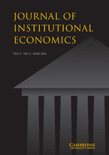
Journal of Institutional Economics
Empowering Research at the Intersection of Governance and EconomicsJournal of Institutional Economics, published by Cambridge University Press, stands as a premier forum for the dissemination of research at the intersection of economics, institutions, and governance. With an ISSN of 1744-1374 and E-ISSN 1744-1382, this journal has established itself as a vital resource within the academic community, achieving an impressive Q1 ranking in the field of Economics, Econometrics and Finance as of 2023. The journal's focus on institutional analysis not only enhances our understanding of economic phenomena but also fosters interdisciplinary dialogue among scholars and practitioners alike. With a commendable rank of 39 out of 288 in Scopus rankings, placing it in the 86th percentile, the Journal of Institutional Economics provides access to groundbreaking research that holds significant implications for policy and decision-making. Researchers, professionals, and students engaged in the study of economic systems will find this journal an invaluable addition to their academic resources.
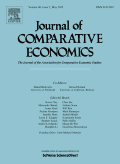
JOURNAL OF COMPARATIVE ECONOMICS
Unveiling the Complexities of Economic ComparisonsThe Journal of Comparative Economics is a leading academic journal published by Academic Press Inc Elsevier Science, focusing on the field of Economics and Econometrics. With an impressive Q1 ranking in the 2023 Category Quartiles and a robust Scopus rank of #205 out of 716, this journal maintains a prestigious position in the discipline, indicating its significance for researchers and practitioners alike. Since its inception in 1977, the journal has been committed to fostering the advancement of comparative economics by publishing high-quality, peer-reviewed research that explores the dynamics of economic systems and policies across different cultures and regions. Researchers should note that the journal does not currently offer Open Access options, but its rigorous editorial standards ensure that published articles are widely recognized and influential within the field. As the journal converges towards its 2024 volume, it remains an invaluable resource for scholars aiming to deepen their understanding of economic comparisons, effectively bridging theory and application in a global context.

Economic History of Developing Regions
Charting the Course of Development Through Historical Analysis.Economic History of Developing Regions, published by Routledge Journals, Taylor & Francis Ltd, is a distinguished academic journal that focuses on the intersection of economic development and historical analysis in emerging economies. Established in 2010, this journal serves as a vital platform for researchers, professionals, and students interested in understanding the economic dynamics and historical contexts that shape developing regions. With its impressive ranking in the Q1 category in History and Q3 in both Development and Economics, it has established itself as a credible source for innovative research and critical insights. Despite being a non-open access publication, it consistently aims to bridge the gap between historical understanding and economic strategies, making it essential reading for those engaged in the studies of economics, history, and development. Emphasizing rigorous academic standards, the journal highlights quality scholarship that contributes to the discourse on sustainable development and policy frameworks essential for evolving economies.
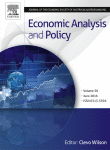
Economic Analysis and Policy
Leading the Way in Economic Insights and Policy DevelopmentEconomic Analysis and Policy is an esteemed academic journal published by ELSEVIER, dedicated to advancing the field of economics and econometrics since its inception in 1970. Based in the Netherlands, this journal plays a pivotal role in disseminating high-quality research that addresses contemporary economic issues and policy challenges. With an impressive Q1 ranking in both the Economics and Econometrics categories, and recognition in the top 91st percentile of Scopus rankings, it is a leading platform for scholars, professionals, and students seeking to contribute to and engage with the evolution of economic thought. The journal does not currently operate on an open access model, allowing it to maintain rigorous peer-review standards that ensure the integrity and impact of published research. As a vital resource for anyone interested in the intersection of theory and policy in economics, Economic Analysis and Policy fosters a community committed to rigorous analysis and innovative solutions in the economic domain.
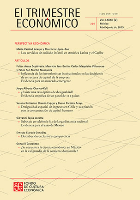
TRIMESTRE ECONOMICO
Illuminating Economic Trends Through Rigorous Research.TRIMESTRE ECONOMICO, published by FONDO CULTURA ECONOMICA, is a prominent open access journal in the field of Economics and Econometrics based in Mexico. Since its inception in 1979, this journal has served as a critical platform for disseminating scholarly research and theoretical advancements within economic sciences, addressing both contemporary issues and historical perspectives. With an impact factor that ranks it within the Q3 category among 716 journals in its field, TRIMESTRE ECONOMICO continues to contribute significantly to the academic community, providing readers with insights into economic modeling, policy analysis, and empirical research. The journal has embraced open access since 2011, fostering a broad reach and encouraging innovation and collaboration among researchers, professionals, and students. It is essential reading for those seeking to deepen their understanding of economic trends and theories, making valuable contributions to both local and global discussions.

International Advances in Economic Research
Exploring Innovative Theories and Practices in EconomicsInternational Advances in Economic Research, published by SPRINGER, stands as a significant resource within the field of economics and econometrics, consistently contributing to the theoretical and empirical understanding of economic phenomena since its inception in 1995. With an ISSN of 1083-0898 and E-ISSN of 1573-966X, this journal is dedicated to advancing economic research through a rigorous peer-review process and disseminating high-quality scholarly articles. The journal's esteemed classification places it in the third quartile (Q3) within the Economics and Econometrics category for 2023, indicating its respectable standing in academic circles. It serves as an important conduit for the dissemination of innovative economic theories, data analysis, and policy discussions, appealing to researchers, professionals, and students alike. Though not an open-access journal, it provides valuable subscription-based content that enriches the understanding of diverse economic issues and fosters a community of inquiry among academics. With its projected outlook extending to 2024, International Advances in Economic Research continues to be an essential platform for scholars aiming to influence and engage with contemporary economic debates.
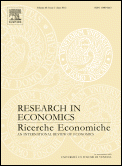
Research in Economics
Shaping the future of economic scholarship and practice.Research in Economics, published by ELSEVIER SCI LTD, is a distinguished peer-reviewed journal that addresses pivotal issues in the field of economics and econometrics. Since its inception in 1997, the journal has provided a platform for innovative research and theoretical development, welcoming contributions that push the boundaries of traditional economic thought. With an ISSN of 1090-9443 and an E-ISSN of 1090-9451, it currently holds a respectable position in the Q3 category of the 2023 rankings for Economics and Econometrics. Despite its current Scopus rank of #500 out of 716, representing the 30th percentile, the journal continues to cultivate a rich community of researchers, practitioners, and students dedicated to advancing economic knowledge. While it operates without an Open Access option, the journal remains committed to disseminating high-quality research that informs both academic scholarship and practical applications in the economic landscape.

Revista de Historia Industrial
Advancing Knowledge in the Realm of Industrial HistoryRevista de Historia Industrial, published by UNIV BARCELONA, DEPT HISTORIA, INST ECONOMIQUES, is a premier journal dedicated to the field of industrial history. With a proud ISSN of 1132-7200 and E-ISSN 2385-3247, this esteemed publication has been instrumental in shaping scholarly discourse since its inception in 1996, notably covering a wide array of topics related to industrial development, economic transitions, and historical methodologies through its issues published from 2011 to 2024. Distinguished by its Q1 ranking in History and its influence reflected in a 73rd percentile position among arts and humanities journals, the journal facilitates access to valuable insights for researchers, professionals, and students alike. While it is not an open access journal, its commitment to rigorous academic standards and insightful analyses ensures its relevance in the ever-evolving field of industrial history, providing an essential platform for the exchange of knowledge and innovative research. The journal's multi-faceted scope also intersects with the history and philosophy of science, making it a vital resource for interdisciplinary studies as well.

Asia-Pacific Economic History Review
Bridging Past and Present: Insights into Asia-Pacific EconomiesAsia-Pacific Economic History Review is a distinguished journal published by WILEY, focusing on the rich and dynamic intersection of economic and historical perspectives within the Asia-Pacific region. With the ISSN 2832-157X, this peer-reviewed journal stands out for its commitment to open access, ensuring that groundbreaking research is readily available to academics and practitioners alike. As a newly established platform from 2023 to 2024, it has rapidly garnered attention, earning a Q1 classification in History and Q3 in Economics and Econometrics for 2023, reflecting its dual significance in both fields. The journal's ranking within the Scopus database showcases its rising impact, particularly within the top percentile for Arts and Humanities in History. Scholars are encouraged to contribute to this high-quality, interdisciplinary forum that explores the economic histories of the Asia-Pacific region, providing valuable insights and fostering discourse among researchers, professionals, and students passionate about this vital area of study.
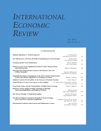
INTERNATIONAL ECONOMIC REVIEW
Fostering scholarly dialogue in economics and econometrics.INTERNATIONAL ECONOMIC REVIEW is a prestigious journal dedicated to advancing knowledge in the fields of economics and econometrics. Published by Wiley in the United Kingdom, this journal boasts an impressive Q1 ranking in the 2023 category of Economics and Econometrics, reflecting its significant impact in the academic community. With a continued publication since its inception in 1979, it offers a platform for rigorous scholarly articles that address contemporary issues, theoretical developments, and empirical findings in economics. Although it does not currently offer open access options, the journal maintains broad accessibility through institutional subscriptions. Researchers, professionals, and students are encouraged to contribute to and engage with this leading publication to foster knowledge exchange and stimulate scholarly dialogue in economic research. With its commitment to high-quality scholarship, the INTERNATIONAL ECONOMIC REVIEW remains a vital resource for developing insights that inform both policy and practice.